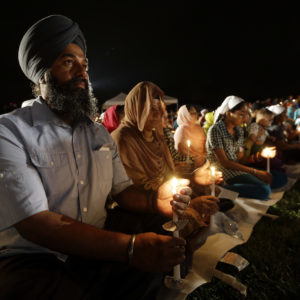August 5, 2017 marks the five-year anniversary of the one of worst faith-based hate attacks in U.S. history. Not since the bombing of the 16th Street Baptist Church in 1963 had the country seen mass murder committed at such a scale at a place of prayer. This attack of horrific proportion not only changed my life and my family’s life, but also the lives of those in my faith community, and faith communities at large.
This day five years ago, my mother and father attended Sunday prayer at our Sikh Temple, known as Gurdwara, when a gunman opened fire. The shooter was an affiliated white supremacist who, in his path of carnage, killed six Sikh Americans and injured four others before taking his own life during a fire fight with responding police officers. My father was among those who lost their lives in the senseless act of hate-fueled violence, and not a day goes by that I do not think of those who we lost.
As our country reeled in the aftermath, Americans of all faiths and political backgrounds stood together in solidarity with the Sikh community. This swift response showed that even in times of tremendous political division, there is still a common humanity that unites us.
The outpouring of kindness that our neighbors and the general public displayed in the aftermath of the shooting was representative of the principles that my father also instilled in me. Sikhism is grounded in the inherent American value of equality – the belief that men, women and children are all equal, regardless of their faith, where they were born or the color of their skin. The Sikh religion shares many common American values, but its followers are often misunderstood because of their outward physical appearance, and the fact that many wear the Dastaar, or turbans and long beards.
Recent stats show Sikh Americans are common targets of discrimination, intimidation, harassment and hate crimes in the United States because of their physical appearance and misunderstanding of the faith. In reality, the turbans are worn as a reminder that Sikhs can never forget their core values of equality, freedom and love. In fact, those that have taken Amrit, or have been baptized in the faith, are Sikhs who have vowed to love all of humanity.
Because of these pressing misconceptions that Sikhs face, I am proud to support the National Sikh Campaign’s “We Are Sikhs” effort to help inform Americans about who their Sikh neighbors are. “We Are Sikhs” has been running national TV and digital advertising as well as building coalitions of local leaders in communities across the country.
My father was proud to be an immigrant, a Sikh and an American – each inclusive of one another. He served as the Gurdwara President for 15 years, aiming to create a welcoming home for all. He wanted this because he genuinely appreciated his new home in America.
As we look back at that fateful day in Oak Creek, Wisconsin, it is evident America has made great strides accepting and understanding religious minorities. However, despite the recent progress and work of organizations such as the National Sikh Campaign, there is still much that needs to be done. The current political climate and inflamed rhetoric makes it seem as if our country is more divided than ever. In some areas, we might be, but the values that Sikhism is grounded in represent what we all have in common. This campaign included a comprehensive grassroots effort in Fresno, California and is gaining traction to address the need to educate the general populace about Sikhism in the United States.
Five years ago, I saw Democrats, Republicans, Christians, Muslims, Jews, Sikhs, the rich, the poor, and people of all races in the United States and the global community band together in solidarity after this horrific and senseless attack. Despite our cultural, political or religious differences, we share common values and love.

